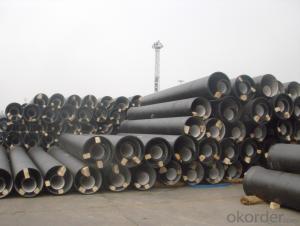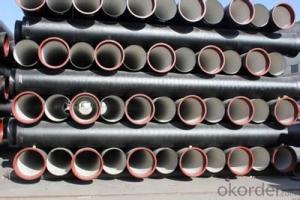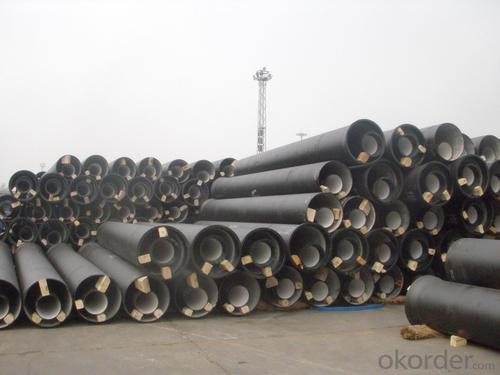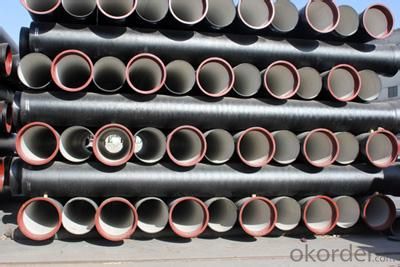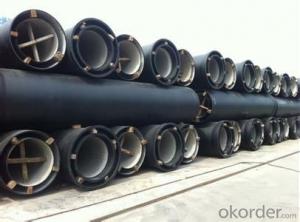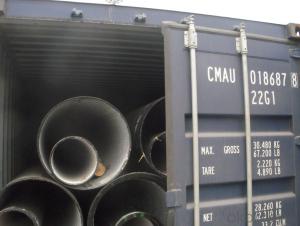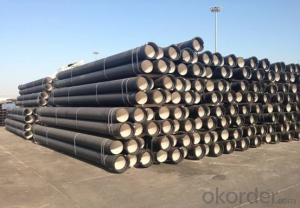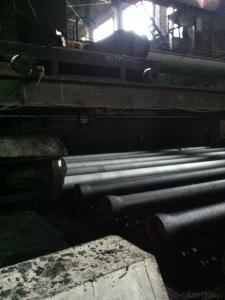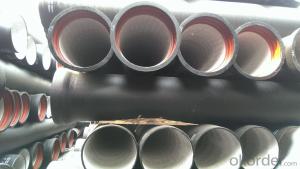DUCTILE IRON PIPES K9 DN125
- Loading Port:
- China Main Port
- Payment Terms:
- TT OR LC
- Min Order Qty:
- -
- Supply Capability:
- -
OKorder Service Pledge
OKorder Financial Service
You Might Also Like
Ductile Iron Cast Pipe is without any defects compare with tradition casting tech, which has many advantages particularly as follow:
(1) High density. In the "vertical upward casting" process, the melt iron of centre liquid column in center crystallizer is continuously feeding for volume shrinkage caused by condensation tube at outer circumference , which lead to be free of shrinkage porosity.
(2) High purity. When melt iron pouring, the mixed impurities such as gas, dross, sand grain which are lighter than melt iron could be eliminated at furnace mouth, its impossible to enter into the crystallizer through the channel, so the melt iron into the crystallizer is very pure.
(3) Strength with toughness. The cooling speed provided by continuous crystallizer is 30 times than sand casting and 5 times than centrifugal casting, and doesn't produce white iron, the eutectic cell volume of continuous cast iron is one eighth to one tenth compare with traditional cast iron. The density of graphite nodule in ductile iron can reach 300-700 pcs/mm2. Therefore, all reason above improve the strength and toughness of continuous cast iron.
(4) Free machining. The high speed cooling make the hardening phase (such as boride, steadite) not appear like reticular, massive or thick, but diffuse like fish bone and pane in shape, moreover, there are tiny graphite flakes inlaid hardening phase. It's free machining in BrinellHardness the range of 250-300HB. However, the Brinell Hardness of 250 is top limit to common metal materials.
(5) Uniform composition of tube wall. The convection mixing of liquid column caused by marching type drawing in crystallizer make the composition of tube wall well-distributed, and concentration gradient very little.
(6) High productivity. To the wall thickness of tube under 10mm, the speed of continuous casting is 1 meter/min, to the wall thickness of tube under 20mm, the speed of continuous casting is 0.5 meter/min, which is high efficiency that centrifugal or other casting tech couldn't reach.
- Q: How is ductile iron pipe different from cast iron pipe?
- Ductile iron pipe and cast iron pipe are commonly used in plumbing and drainage applications, but they have differences in composition, strength, and flexibility. To begin with, ductile iron pipe is made from a different iron alloy than cast iron pipe. Ductile iron contains more carbon and silicon, which gives it increased strength and durability. On the other hand, cast iron pipe is made from gray iron, which has higher carbon content but lacks the flexibility of ductile iron. Moreover, ductile iron pipe is renowned for its superior strength and resistance to impact. It can withstand higher pressures and is less likely to crack or break under heavy loads or external forces. Cast iron pipe, although strong, is more brittle and prone to fractures and failures. Another significant distinction is the flexibility of ductile iron pipe. It possesses greater flexibility and can endure bending and deformation without fracturing. This flexibility facilitates easier installation, particularly in areas with uneven terrain or where ground movement may occur. In contrast, cast iron pipe is less flexible and more rigid, making it unsuitable for applications that require flexibility. Additionally, ductile iron pipe has a smoother interior surface compared to cast iron pipe. This smoothness reduces friction, enhances flow efficiency, and minimizes the accumulation of sediment and deposits within the pipe, resulting in improved water flow and reduced maintenance needs. In conclusion, ductile iron pipe sets itself apart from cast iron pipe due to its composition, strength, flexibility, and smooth interior surface. Ductile iron offers superior strength, impact resistance, and flexibility, making it the preferred choice in various plumbing and drainage applications.
- Q: What is the average weight of ductile iron pipes?
- The average weight of ductile iron pipes can vary depending on the specific dimensions and specifications of the pipe. However, as a general guideline, ductile iron pipes typically range in weight from around 50 pounds per foot to 200 pounds per foot. The weight of a ductile iron pipe is influenced by factors such as the pipe's diameter, wall thickness, and length. It is important to note that these are average weights, and the actual weight of a specific ductile iron pipe may vary. To determine the exact weight of a ductile iron pipe, it is advisable to refer to the manufacturer's specifications or consult engineering guidelines.
- Q: What is the difference between spheroidal graphite cast iron QT400-15 and QT400-15A? What does the A mean later?
- The front is the material grade, and the back of the A should have special requirements.
- Q: Principles for the antiseptic treatment of ductile iron pipes
- Anti corrosion process of ductile iron pipe:1. asphalt paint coatingBituminous paint coatings are pipes used to carry gas. Preheating the pipe before spraying can improve the adhesion of asphalt paint and accelerate drying.2. cement mortar lining + special coatingThe internal corrosion prevention measures are suitable for pipes conveying sewage, and the corrosion resistance of lining can be improved.3. epoxy coal tar coatingThe epoxy coal tar coating is not only suitable for gas pipelines, but also for sewage pipes. It is a two component coating with a high adhesion and a very smooth surface
- Q: Can ductile iron pipe be used for compressed air systems?
- Yes, ductile iron pipe can be used for compressed air systems. Ductile iron pipe is known for its strength, durability, and resistance to cracking, making it suitable for various applications including compressed air systems. It is capable of withstanding high pressure and is less likely to corrode or rust compared to other materials. However, it is important to ensure that the ductile iron pipe is properly sized and installed to handle the specific requirements of the compressed air system. Additionally, regular maintenance and inspection should be conducted to prevent any potential issues or damages.
- Q: Qianwei County ductile iron pipe which tool to use cutting convenience?
- The cutting of ductile iron pipes is usually done by mechanical cutting, and the working intensity of the machine is stronger than that of our normal workers. This cutting method can effectively reduce the labor intensity of workers, and ensure the quality of cutting. There are many different ways in mechanical cutting, such as sawing, grinding, cutting, and cutting with an electric wire cutter.
- Q: Are ductile iron pipes suitable for wastewater systems?
- Yes, ductile iron pipes are suitable for wastewater systems. Ductile iron is a strong and durable material that is resistant to corrosion and can withstand the harsh conditions often found in wastewater systems. It has a high tensile strength, which allows it to handle the pressure and stress caused by the flow of wastewater. Additionally, ductile iron pipes are easy to install and have a long lifespan, making them a cost-effective choice for wastewater systems. Overall, ductile iron pipes are a reliable and suitable option for carrying wastewater in various applications.
- Q: What is the typical diameter range of ductile iron pipes?
- The typical diameter range of ductile iron pipes varies depending on the specific application and industry standards. Generally, ductile iron pipes come in a wide range of diameters to accommodate various needs. In water distribution systems, the typical diameter range can vary from as small as 3 inches (76 mm) to as large as 64 inches (1626 mm) or even larger. For sewer and wastewater systems, the typical diameter range is usually between 4 inches (102 mm) to 48 inches (1219 mm). However, it is important to note that these ranges are not exhaustive and there may be instances where ductile iron pipes are available in sizes outside of these common ranges. It is always advisable to consult industry standards and specific project requirements to determine the appropriate diameter range for ductile iron pipes.
- Q: Can ductile iron pipe be used for water well applications?
- Indeed, water well applications can utilize ductile iron pipe. Renowned for its robustness and durability, ductile iron pipe proves appropriate for a multitude of uses, notably water well systems. Its remarkable resistance to corrosion is paramount in water well applications, as it endures constant exposure to water and potential impurities. Moreover, ductile iron pipe exhibits the capacity to withstand substantial pressure and external loads, rendering it a dependable selection for water well systems necessitating a sturdy and enduring piping material.
- Q: Can ductile iron pipes be repaired if they get damaged?
- Yes, ductile iron pipes can be repaired if they get damaged. The repair process involves identifying the damaged portion of the pipe and assessing the severity of the damage. If the damage is minor, it can be repaired using various techniques such as welding or epoxy lining. For more extensive damage, sections of the pipe may need to be replaced. Pipe repair professionals have the expertise and equipment to identify and fix damaged ductile iron pipes, ensuring their continued functionality and longevity.
Send your message to us
DUCTILE IRON PIPES K9 DN125
- Loading Port:
- China Main Port
- Payment Terms:
- TT OR LC
- Min Order Qty:
- -
- Supply Capability:
- -
OKorder Service Pledge
OKorder Financial Service
Similar products
Hot products
Hot Searches
Related keywords
